英语语音教程汇总
英语语音教程汇总

1 音节(Syllables )英语中一个元音构成一个音节,一个元音加上一个或一个以上的辅音也只构成一个音节。
如:I /ai/ , it /it/, ,bite /bait/, thrift/ θrift /2 重读音节Stressed syllables单音节词都有一个重读音节,但不标出重音符号。
双音节或多音节词有一个音节的元音比其它音节的元音长而响亮,这个长而响亮的音节称为重读音节.有些多音节词中除了主重音(Primary Stress),还可以有次重音(Secondary Stress)。
重音符号表在重读音节的左上角,次重音符号标在左下角。
我们用“—”表示重读元音,用“.”表示弱读元音,这样把单词中音的长度、响亮度和音调高低用图解表示出来。
3 英语单词重音可遵循以下规律:1 )双音节词作为名词,重音在第一个音节;作为动词,重音在第二个音节。
•名词动词’Record ['rekɔːd] re’cord[ri'kɔ:d;]’Object ['ɔbdʒikt] ob’ject [əb'dʒekt]2) 复合名词重音一般在第一个音节上’B lackboard ’H andbag’B ookstore ’classroom复合动词重音一般在第二个音节上Short’changell-’treat3 )有些复合词有双重重音’A rm’chair ’kind’hearted’four-’footed ’Second-’handed4 )少数复合词重音在第二音节What’ever who’ever your’self through’out英语音标发音表英语国际音标共48个音素,其中元音音素20个,辅音音素28个。
国际音标(英语语音)元音单元音前元音[i:] [i] [e] [æ]中元音[ʌ] [ə:] [ə]后元音[u:] [u] [ɔ:] [ɔ] [a:] 双元音开合双元音[ei] [ai] [ɔi] [əu] [au]集中双元音[iə] [εə] [uə]辅音爆破音清辅音[p] [t] [k]浊辅音[b] [d] [g]摩擦音清辅音[f] [s] [ʃ] [θ] [h]浊辅音[v] [z] [ʒ] [ð]破擦音清辅音[tʃ] [tr] [ts]浊辅音[dʒ] [dr] [dz]鼻音(浊辅音)[m] [n] [ŋ]舌则音(浊辅音)[l] [r]半元音(浊辅音)[w] [j]英语发音器官图英国英语辅音表发音部位发音方式双唇唇齿齿齿龈齿龈硬腭舌前硬腭软颚声门舌前齿龈爆破音清P t k浊 b d g摩擦音清 f θs ʃh浊v ðz ʒr 破擦音清tʃ浊dʒ鼻音浊m n ŋ舌侧音浊l半元音浊w j规则动词过去式加“ed”后的发音规则规则动词过去式加“ed”后的发音规则在浊辅音和元音后面 [d]Called borrowedmoved [mu:vd] enjoyedWelcomedanswered在清辅音后面 [t]askedfinishedhelped[helpt]passed [pa:st]reached在[t]音后面 [id]wanted['wCntid] started['sta:tid] [d]音后面[id]needed['ni:did] counted['kauntid]0补充说明:规则动词的过去式由“动词原形+-ed”构成,具体变化有:1. 直接在词尾加-ed。
pep英语语音知识汇总
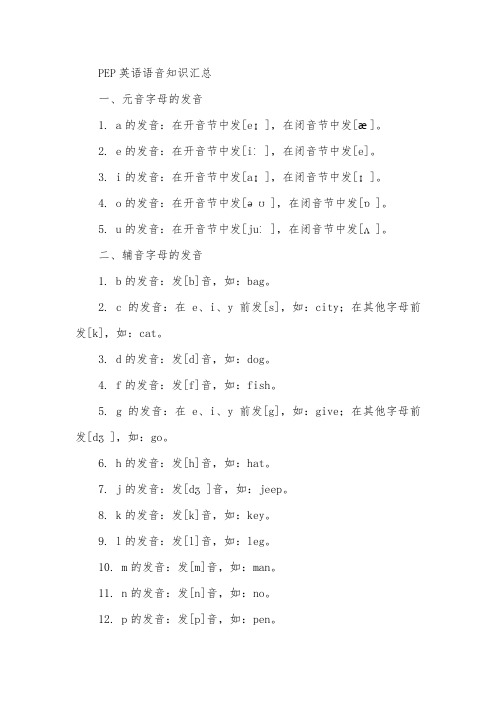
PEP英语语音知识汇总一、元音字母的发音1. a的发音:在开音节中发[eɪ],在闭音节中发[æ]。
2. e的发音:在开音节中发[iː],在闭音节中发[e]。
3. i的发音:在开音节中发[aɪ],在闭音节中发[ɪ]。
4. o的发音:在开音节中发[əʊ],在闭音节中发[ɒ]。
5. u的发音:在开音节中发[juː],在闭音节中发[ʌ]。
二、辅音字母的发音1. b的发音:发[b]音,如:bag。
2. c的发音:在e、i、y前发[s],如:city;在其他字母前发[k],如:cat。
3. d的发音:发[d]音,如:dog。
4. f的发音:发[f]音,如:fish。
5. g的发音:在e、i、y前发[g],如:give;在其他字母前发[dʒ],如:go。
6. h的发音:发[h]音,如:hat。
7. j的发音:发[dʒ]音,如:jeep。
8. k的发音:发[k]音,如:key。
9. l的发音:发[l]音,如:leg。
10. m的发音:发[m]音,如:man。
11. n的发音:发[n]音,如:no。
12. p的发音:发[p]音,如:pen。
13. q的发音:发[kjuː]音,如:queue。
14. r的发音:发[r]音,如:run。
15. s的发音:在e、i、y前发[s],如:is;在其他字母前发[z],如:sun。
16. t的发音:发[t]音,如:table。
17. v的发音:发[v]音,如:vee。
18. w的发音:发[w]音,如:we。
19. x的发音:在词尾时发[ks],如:box;在词中时发[gz],如:six。
20. y的发音:在开音节中发[aɪ],在闭音节中发[j],如:yes。
21. z的发音:发[z]音,如:zoo。
英标表48个发音教学

英标表48个发音教学一、元音(20个)1. 长元音(5个)- /ɑ:/:发音时口张大,舌身压低并后缩,舌尖不抵下齿,双唇稍收圆。
例如:car(汽车),far(远的)。
- /ɔ:/:由/ɔ/滑向/:/,双唇收得又圆又小,并向前突出,舌尖不触下齿,舌身往后缩。
如:dog(狗)中的“o”字母在英式发音中发/ɔ:/。
- /ɜ:/:舌身尽量向硬腭尽量抬起,舌尖不触下齿,舌位接近半高,双唇向两旁伸开,成扁平形。
例如:bird(鸟),nurse(护士)。
- /u:/:双唇收圆,突出成小孔,并尽量突出,舌尖尽量后缩,舌尖不触下齿,舌身后缩。
如:blue(蓝色),ruler(尺子)。
- /əʊ/:由/ə/滑向/ʊ/,由扁平到收圆。
例如:go(去)。
2. 短元音(7个)- /ʌ/:舌尖和舌端两侧轻触下齿,舌身向硬腭尽量抬起,嘴唇向两旁伸开,成扁平形。
如:bus(公共汽车),cup(杯子)。
- /ɒ/:双唇收圆,稍突出,舌尖不触下齿,舌身尽量往后缩。
例如:box(盒子),hot(热的)。
- /əʊ/:由/ə/滑向/ʊ/,由扁平到收圆。
例如:go(去)。
- /u/:双唇收圆,稍突出,舌尖离开下齿,舌身后缩,舌尖不触下齿。
例如:book(书),look(看)。
- /e/:舌尖抵下齿,舌前部向硬腭尽量抬起,嘴唇向两旁伸开,成扁平形。
例如:pen(钢笔),red(红色)。
- /æ/:舌尖抵下齿,舌前部向硬腭尽量抬起,嘴唇向两旁伸开,成扁平形。
例如:cat(猫),map(地图)。
3. 双元音(8个)- /eɪ/:由/e/滑向/ɪ/,舌尖抵住下齿,舌前部向硬腭尽量抬起,由扁平到收窄。
例如:cake(蛋糕),name(名字)。
- /aɪ/:由/a/滑向/ɪ/,舌尖抵住下齿,舌身尽量向硬腭抬起,由张大到收窄。
例如:bike(自行车),ice(冰)。
- /ɔɪ/:由/ɔ/滑向/ɪ/,双唇由扁平到收圆。
例如:boy(男孩)。
- /əʊ/:由/ə/滑向/ʊ/,由扁平到收圆。
英语语音教程 (1)

Organs of Articulation and English Phonemes
Organs of Articulation 发音器官
1. 上唇upper lip 3. 上齿upper teeth 5. 齿龈隆骨upper teeth ridge 7. 软腭soft palate 9. 舌端the tip of the tongue 11. 舌后the back of the tongue 13. 声带vocal cords 15. 咽头pharynx 17. 鼻腔nasal cavity
Organs of Articulation and English Phonemes
Classification of Consonants 辅音的分类
The lips, the tongue, the soft palate with the uvula, the vocal cords and the lower jaw are very active in the articulation of speech sounds. So speech sounds are produced by the vibration of the vocal cords and the definite movement of these organs of speech.
English Phonemes 音素
There are 48 phonemes in English, among which 20 are vowels and 48 are consonants. When they are drawn near together, they are made to vibrate by the air coming from the lungs, thus producing voice. When we pronounce vowels and voice consonants, the vocal cords are drawn near together and vibrate. When we pronounce voiceless consonants, the vocal cords are kept apart and, of course, do not vibrate.
英语语音基础知识归纳总结

英语语音基础知识归纳总结英语语音是学习英语的重要一环,它包括音标、音素、音节、重音等内容。
本文将对英语语音基础知识进行归纳总结,帮助读者更好地理解和掌握英语语音。
1. 音标(Phonetic Symbols)音标是表示语音的符号,它能够准确地表示英语中的各种音素。
英语中常用的音标包括国际音标(International Phonetic Alphabet,简称IPA)和美式音标(American Phonetic Alphabet,简称APA)。
音标的使用能够帮助我们正确地发音,并且提高听力理解能力。
2. 音素(Phonemes)音素是构成语言声音系统的最小单位,它是区分词义的基本要素。
英语中有约40个音素,包括元音、辅音和半元音。
在学习英语时,我们需要掌握这些音素的发音特点,并且能够正确地辨认和发出这些音素。
3. 元音(Vowels)元音是指发音时,舌头不接触其他任何部位,声音通过口腔直接发出的音素。
英语中有12个单元音和8个双元音。
单元音包括/i:/、/ɪ/、/e/、/æ/、/ɑ:/、/ʌ/、/ɔ:/、/ʊ/、/u:/、/ə/、/ɒ/和/ɜ:/。
双元音包括/eɪ/、/aɪ/、/ɔɪ/、/aʊ/、/əʊ/、/ɪə/、/eə/和/ʊə/。
掌握元音的发音规律是学好口语的基础。
4. 辅音(Consonants)辅音是指发音时,声音需要通过舌头、牙齿、唇等部位的阻塞或摩擦才能发出的音素。
英语中有大约24个辅音。
辅音的发音规律相对复杂,需要通过不断练习和模仿来掌握。
5. 音节(Syllables)音节是词的发音单位,它由一个或多个音素组成。
英语中的音节有三种类型:开音节、闭音节和开合音节。
开音节是指以元音结尾的音节,如“me”、“go”;闭音节是指以辅音结尾的音节,如“cat”、“sit”;开合音节是指以元音加辅音结尾的音节,如“must”、“help”。
6. 重音(Stress)重音是指在一个词中着重发音的音节,它在词的发音中起到非常重要的作用。
英语语音教程_辅音
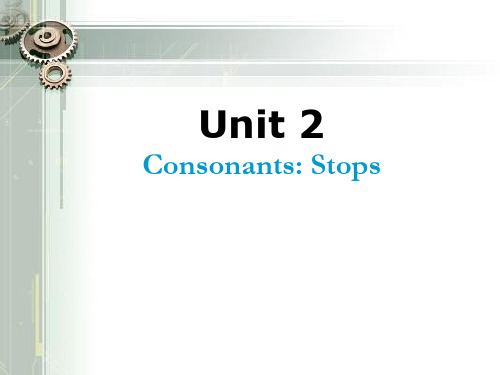
/p/---Dialogue
“Passports, Please” (Mr. And Mrs. Chapman are at the airport. They have
just gotten off the plane from Paris.) Official: Passport, Please. Mr. Chapman: I think I’ve lost our passports, Pam. Mrs. Chapman: Oh, Peter, how could you be so stupid?
These stops are among the most frequent sounds in English and have fairly consistent spellings.
Introduction
爆破音是由在口腔中发音器官中的某部位对 气流形成阻塞,气流从口腔中冲破阻碍爆破而 成, 其特点是一发即止,不能拖音.
Unit 2
Consonants: Stops
Consonants Chart
双唇 唇齿 齿音 齿龈音 齿龈后 硬腭 软腭 声门
爆破 清 [p]
[t]
浊 [b]
[d]
摩擦 清
[f] [T] [s] [S]
浊
[v] [D] [z] [Z]
破擦 清
[tS]
浊
[dZ]
鼻音
[m]
[n]
舌边/旁流
[l]
[k] [g]
辅音 /p/
Producing sound The /p/ sound is made by closing the
mouth and pushing the lips apart. The teeth are apart, but not shown. The tongue is in the middle of the mouth. Air is blown through quickly.
英语语音语调简明教程

not hot dog sorry fog blog clock
/u:/ /u/
room moon noon choose tool fool school good took cook look book put
/ə:/ /ə/
bird first nurse purple
/∫/ /З/
shape shame shine show should
measure pleasure occasion persuasion
/t∫/ /dЗ/
chair child children church
orange age large college juice
/t∫/ /dЗ/
/ei/
/i:/---/ei/
sea—say green—grain sheep—shape
great---greet real---rail wheel---whale
/ai/ /æ / /e/
sad---side smell---smile child
cat---kite fell---file
b. [ j ] 与 [ d ] 相邻时, [ j ] 受了邻音 [ d ] 的影响变成了[ ӡ ], 与[ d ]一起构 成了[dӡ ], 例如:Did you do it? 中的 [did ju:] 可以读成 [ didӡu: ]。 又如:Would you like to go with me?
Weak forms:
and
/nd/
new night name now noon moon kind fine wine
English sing song thing finger wing
英语语音教程
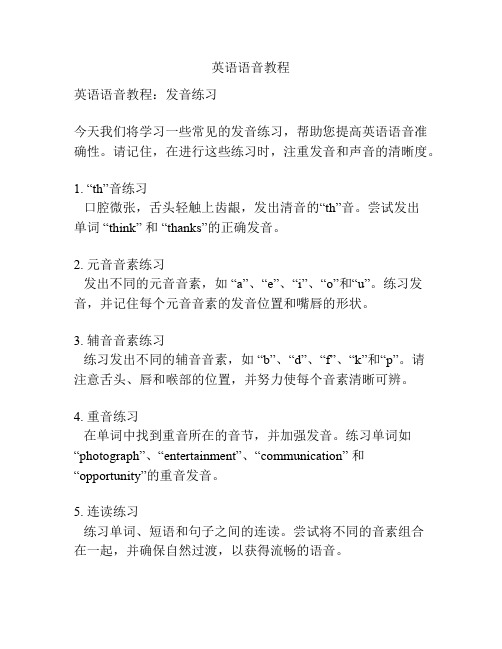
英语语音教程
英语语音教程:发音练习
今天我们将学习一些常见的发音练习,帮助您提高英语语音准确性。
请记住,在进行这些练习时,注重发音和声音的清晰度。
1. “th”音练习
口腔微张,舌头轻触上齿龈,发出清音的“th”音。
尝试发出
单词“think” 和“thanks”的正确发音。
2. 元音音素练习
发出不同的元音音素,如“a”、“e”、“i”、“o”和“u”。
练习发音,并记住每个元音音素的发音位置和嘴唇的形状。
3. 辅音音素练习
练习发出不同的辅音音素,如“b”、“d”、“f”、“k”和“p”。
请
注意舌头、唇和喉部的位置,并努力使每个音素清晰可辨。
4. 重音练习
在单词中找到重音所在的音节,并加强发音。
练习单词如“photograph”、“entertainment”、“communication” 和“opportunity”的重音发音。
5. 连读练习
练习单词、短语和句子之间的连读。
尝试将不同的音素组合
在一起,并确保自然过渡,以获得流畅的语音。
这些练习将帮助您加强英语语音技巧。
请每天练习一段时间,并尽量与英语母语者练习口语交流以加强语音的应用能力。
祝您学有所获!。
英语语音教程汇总-共38页
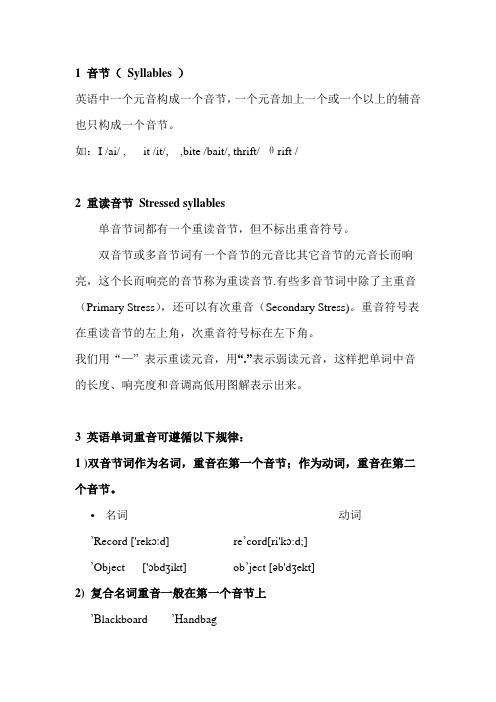
1 音节(Syllables )英语中一个元音构成一个音节,一个元音加上一个或一个以上的辅音也只构成一个音节。
如:I /ai/ , it /it/, ,bite /bait/, thrift/ θrift /2 重读音节Stressed syllables单音节词都有一个重读音节,但不标出重音符号。
双音节或多音节词有一个音节的元音比其它音节的元音长而响亮,这个长而响亮的音节称为重读音节.有些多音节词中除了主重音(Primary Stress),还可以有次重音(Secondary Stress)。
重音符号表在重读音节的左上角,次重音符号标在左下角。
我们用“—”表示重读元音,用“.”表示弱读元音,这样把单词中音的长度、响亮度和音调高低用图解表示出来。
3 英语单词重音可遵循以下规律:1 )双音节词作为名词,重音在第一个音节;作为动词,重音在第二个音节。
•名词动词’Record ['rekɔːd] re’cord[ri'kɔ:d;]’Object ['ɔbdʒikt] ob’ject [əb'dʒekt]2) 复合名词重音一般在第一个音节上’B lackboard ’H andbag’B ookstore ’classroom复合动词重音一般在第二个音节上Short’changell-’treat3 )有些复合词有双重重音’A rm’chair ’kind’hearted’four-’footed ’Second-’handed4 )少数复合词重音在第二音节What’ever who’ever your’self through’out英语音标发音表英语国际音标共48个音素,其中元音音素20个,辅音音素28个。
国际音标(英语语音)元音单元音前元音[i:] [i] [e] [æ]中元音[ʌ] [ə:] [ə]后元音[u:] [u] [ɔ:] [ɔ] [a:] 双元音开合双元音[ei] [ai] [ɔi] [əu] [au]集中双元音[iə] [εə] [uə]辅音爆破音清辅音[p] [t] [k]浊辅音[b] [d] [g]摩擦音清辅音[f] [s] [ʃ] [θ] [h]浊辅音[v] [z] [ʒ] [ð]破擦音清辅音[tʃ] [tr] [ts]浊辅音[dʒ] [dr] [dz]鼻音(浊辅音)[m] [n] [ŋ]舌则音(浊辅音)[l] [r]半元音(浊辅音)[w] [j]英语发音器官图英国英语辅音表发音部位发音方式双唇唇齿齿齿龈齿龈硬腭舌前硬腭软颚声门舌前齿龈爆破音清P t k浊 b d g摩擦音清 f θs ʃh浊v ðz ʒr 破擦音清tʃ浊dʒ鼻音浊m n ŋ舌侧音浊l半元音浊w j规则动词过去式加“ed”后的发音规则规则动词过去式加“ed”后的发音规则在浊辅音和元音后面 [d]Called borrowedmoved [mu:vd] enjoyedWelcomedanswered在清辅音后面 [t]askedfinishedhelped[helpt]passed [pa:st]reached在[t]音后面 [id]wanted['wCntid] started['sta:tid] [d]音后面[id]needed['ni:did] counted['kauntid]0补充说明:规则动词的过去式由“动词原形+-ed”构成,具体变化有:1. 直接在词尾加-ed。
英语知识点归纳语音

英语知识点归纳语音语音是语言交流的基本要素之一,它涉及到发音、声调、重音等方面。
在英语中,也存在着一些特定的语音规则和规范。
下面将详细介绍英语中的语音知识点。
一、辅音音位1. 发音位置英语中的辅音音位包括:唇音、齿音、龈音、舌面音、卷舌音、喉音等。
其中,唇音是以双唇为发音部位,如/p/和/b/;齿音是以舌尖或舌尖与上齿槽之间的接触来发音,如/t/和/d/;龈音是以舌尖或舌尖与上龈腭之间的接触来发音,如/n/和/l/;舌面音是以舌面或舌背与硬腭(即上颚骨)之间的接触来发音,如/k/和/g/;卷舌音是以舌尖或舌尖与上齿槽之间的接触来发音,并使舌后部向软腭(即软颚)靠近,如/r/;喉音是以声带为发音部位,如/h/。
2. 发音方法英语中的辅音音位根据发音方法的不同,又可分为爆破音、摩擦音、鼻音、舌侧音和近音。
爆破音是在发音过程中,由于气流被阻碍而突然释放出来,如/p/和/b/;摩擦音是由于气流通过阻塞部位时,产生摩擦声音,如/f/和/v/;鼻音是气流通过鼻腔而产生的音,如/m/和/n/;舌侧音是舌尖或舌侧与口腔两侧相接触,同时使气流通过舌侧形成的音,如/l/;近音是发音时,舌面(或舌背)与硬腭靠得很近,气流经过时产生近乎中断的音,如/r/。
二、元音音位1. 发音部位英语中的元音音位可以根据舌位的高低和前后位置进行分类。
根据舌位的高低,元音可以分为高元音、中元音和低元音。
高元音是指舌位最高的元音,如/i:/和/u:/;中元音是指舌位略低的元音,如/ε/和/ə/;低元音是指舌位最低的元音,如/æ/和/ɔ:/。
根据舌位的前后位置,元音可以分为前元音、中元音和后元音。
前元音是指舌位最前的元音,如/i:/和/ε/;中元音是指舌位位置略靠后的元音,如/ə/和/ʌ/;后元音是指舌位最后的元音,如/u:/和/ɔ:/。
2. 发音时长英语中的元音音位还可以根据发音时长进行分类。
短元音的发音时长较短,如/æ/和/ʌ/;长元音的发音时长较长,如/i:/和/u:/。
小学英语六年级上册语音知识汇总
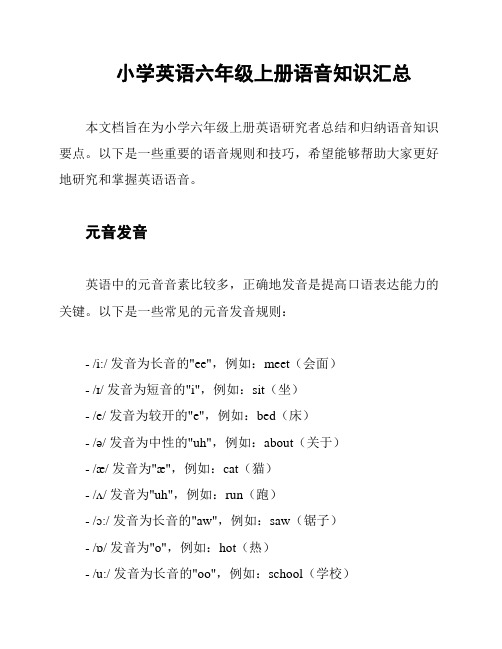
小学英语六年级上册语音知识汇总本文档旨在为小学六年级上册英语研究者总结和归纳语音知识要点。
以下是一些重要的语音规则和技巧,希望能够帮助大家更好地研究和掌握英语语音。
元音发音英语中的元音音素比较多,正确地发音是提高口语表达能力的关键。
以下是一些常见的元音发音规则:- /i:/ 发音为长音的"ee",例如:meet(会面)- /ɪ/ 发音为短音的"i",例如:sit(坐)- /e/ 发音为较开的"e",例如:bed(床)- /ə/ 发音为中性的"uh",例如:about(关于)- /æ/ 发音为"æ",例如:cat(猫)- /ʌ/ 发音为"uh",例如:run(跑)- /ɔ:/ 发音为长音的"aw",例如:saw(锯子)- /ɒ/ 发音为"o",例如:hot(热)- /u:/ 发音为长音的"oo",例如:school(学校)- /ʊ/ 发音为短音的"oo",例如:book(书)- /ɑ:/ 发音为长音的"ah",例如:car(汽车)辅音发音正确地发音辅音对于准确表达英语单词是很重要的。
以下是一些常见的辅音发音规则:- /p/ 发音为"p",例如:pen(笔)- /b/ 发音为"b",例如:book(书)- /t/ 发音为"t",例如:top(顶)- /d/ 发音为"d",例如:dog(狗)- /k/ 发音为"k",例如:cat(猫)- /g/ 发音为"g",例如:go(去)- /f/ 发音为"f",例如:fish(鱼)- /v/ 发音为"v",例如:van(货车)- /θ/ 发音为"th",例如:think(思考)- /ð/ 发音为"th",例如:this(这)- /s/ 发音为"s",例如:sun(太阳)- /z/ 发音为"z",例如:zebra(斑马)- /ʃ/ 发音为"sh",例如:sheep(羊)- /ʒ/ 发音为"zh",例如:treasure(宝藏)- /tʃ/ 发音为"ch",例如:chair(椅子)- /dʒ/ 发音为"j",例如:jump(跳跃)- /h/ 发音为"h",例如:hat(帽子)- /m/ 发音为"m",例如:map(地图)- /n/ 发音为"n",例如:name(名字)- /ŋ/ 发音为"ng",例如:sing(唱)- /l/ 发音为"l",例如:like(喜欢)- /r/ 发音为"r",例如:red(红色)- /w/ 发音为"w",例如:water(水)- /j/ 发音为"y",例如:yes(是)音节划分正确地划分单词的音节可以帮助我们更好地发音。
英语语音教程大全

[a:] 发这个音的字母和字母组合 a: grass glass class plant dance fast ar: car star arm March garden dark au: laugh aunt ear: heart
根据发音规则,找出发[a:]的2个单词。 1.arm lip doctor card 2.cloud cart garden gate 3.ball scarf dark tiger 4.job lorry March park
Front vowels: /i:/ /i/ /e/ /æ/ Central vowels: /ʌ/ /ə:/ /ə/
请判断以下单词中的字母分别发什么音
• a: bad apple about manage • e: egg these decide • i: this family • o: son love protect polite • u: sun succeed support
的单词。
1.sofa sit kick lip 2.ink gift jam ship 3.hand picture big sister 4.hot lick pig jelly
Tongue twister
• I wish to wish the wish you wish to wish, but if you wish the wish the witch wishes, I won’t wish the wish you wish to wish.
• A bird in hand is worth two in the bush.
There are thirty thirsty birds in the third tree. The nurse in skirts washed thirty dirty shirts.
英语语音知识归纳总结

英语语音知识归纳总结English pronunciation is a crucial aspect of language learning that can significantly impact communication. It involves the correct articulation of sounds, stress patterns, and intonation.Understanding the phonetic alphabet is fundamental. Each symbol represents a specific sound, allowing learners to decode words phonetically. This skill is particularly useful for spelling and pronunciation.Stress patterns are essential for clear speech. In English, some syllables are stressed more than others, which can change the meaning of words. For example, the word "record" can mean a document or a vinyl disk, depending on which syllable is stressed.Intonation is the rise and fall of pitch in speech. It helps convey emotion and intention. For example, a rising intonation at the end of a sentence can indicate a question, while a falling intonation can signal a statement.Consonant clusters can be challenging for non-native speakers. They are groups of consonants that appear together without an intervening vowel. Practice is key to mastering these sounds.Vowel sounds in English are more complex than in manyother languages. They can be short or long, and the same letter can represent different sounds in different words.The schwa sound, represented by the symbol /ə/, is the most common vowel sound in English. It is the unstressed and neutral 'uh' sound found in many unstressed syllables.Learning pronunciation rules can be helpful, but it's also important to listen to native speakers and mimic their speech patterns. This exposure helps internalize the natural rhythms of the language.In conclusion, mastering English pronunciation requires a combination of understanding the basics, practicing specific sounds, and immersing oneself in the language through listening and speaking. It's a skill that can greatly enhance one's fluency and confidence in English.。
英语48个音标发音详细教程

英语48个音标发音详细教程英语语音的基本单位是音素(Phoneme),它是由发音器官产生的语音单元。
英语中共有48个音标,这些音标由美式音标和英式音标组成,它们在发音上有一些细微的差别。
下面是英语48个音标的详细教程。
1. 单元音(Monophthongs):a. 清元音(Pure vowels):(1)前元音:•/i:/-如"He"的发音,唇齿微微张开,舌头抬起。
•/ɪ/-如"Is"的发音,舌头稍微抬起,略微向前。
• /e/ - 如"Red"的发音,唇齿稍微张开,舌头稍微向前。
• /æ/ - 如"Cat"的发音,舌头处于低位,口稍微张开,舌头稍微前移。
(2)中元音:•/ʌ/-如"Up"的发音,唇齿微微张开,舌头放松,舌根抬起。
• /ɜ:/ - 如"Work"的发音,唇齿稍微张开,舌头放松,略微上升。
• /ə/ - 如"About"的发音,唇齿放松,舌头放松。
(3)后元音:• /ʊ/ - 如"Foot"的发音,唇齿张开,舌头低位,舌根稍微抬起。
• /u:/ - 如"Food"的发音,唇齿大张,舌头稍微前移。
• /ɔ:/ - 如"Thought"的发音,嘴巴稍微张开,舌头稍微抬起。
• /ɑ:/ - 如"Car"的发音,嘴巴张开,舌头稍微抬起。
b. 滑音(Diphthongs):• /eɪ/ - 如"Day"的发音,由[e]和[ɪ]组成,舌头由前移到后。
• /aɪ/ - 如"Time"的发音,由[a]和[ɪ]组成,嘴由稍微张开到稍微闭合。
• /ɔɪ/ - 如"Boy"的发音,由[ɔ:]和[ɪ]组成,舌由半开到半合。
英语语音教程 (3)

Unit 3
Vowels(I) 元音 (2)
FOCUS Diphthongs 双元音 The Closing Diphthongs 合口双元音 The Centering Diphthongs 集中双元音 Principles of Diphthongs 双元音的原则 Exercises 练习
day and night
in the same way leave a space
wait at the gate
heavy rain
table tennis
a helpless case a special case
a terrible headache an ancient temple game of chess
3. Listen to the recording, read the following phrases, and circle the words with the pronunciation of [ei].
hate to be late
save her face
on the same day call a spade a spade
save famous statement operation
shame waste education
payment complain explanation
station nation ashamed
snake obtain today
1. The Closing Diphthongs
Exercise I
1. There is a slight closing movement of the lower jaw; 2. It begins with [e]and glides smoothly to [i].
英语语音教程(整理版)

英语语音教程(整理版)English n Tutorial1.SyllablesIn English。
a syllable consists of one vowel sound。
or one vowel sound plus one or more consonant sounds。
For example。
"I," "it," "bite," and "thrift" all have one syllable.2.Stressed SyllablesSingle-syllable words in English have a stressed syllable。
but it is not marked with a stress symbol。
For words with two or more syllables。
one syllable will have a longer and louder vowel sound than the other syllables。
This syllable is called the stressed syllable。
Some words with multiple syllables may have a secondary stress。
in n to the primary stress。
The stress symbol is placed in the top left corner for the primary stress and in the bottom left corner for the secondary stress.3.Vowel Sounds in Stressed Open and Closed Syllables1) Open Syllables: There are two types of open syllables。
英语48个音标发音教程

英语48个音标发音教程The English language comprises of 48 phonetic sounds, also known as phonemes, which are essential for effective pronunciation. Mastering these sounds is crucial for improving your English speaking skills. In this tutorial, we will guide you through each of the 48 phonetic sounds and teach you how to produce them accurately.The 48 phonetic sounds in English are divided into consonant and vowel sounds. Consonant sounds are produced by partially or completely obstructing the airflow, while vowel sounds are produced with an open vocal tract.Let's start with the consonant sounds.1. /p/: This is the sound of "p" as in "pen."2. /b/: This sound is made by closing the lips and then releasing them, as in "bad."3. /t/: Pronounce this sound by placing the tip of your tongue against the roof of your mouth, as in "top."4. /d/: Release the tongue from the roof of your mouth after pronouncing /t/, as in "dog."5. /k/: Make this sound by closing the back of your throat, as in "cat."6. /g/: Release the back of your throat after pronouncing /k/, as in "good."7. /f/: This is the sound of "f" as in "feet."8. /v/: This sound is made by gently placing your top teeth on your lower lip and releasing the air, as in "vase."9. /θ/: Press the tip of your tongue against your top front teeth, asin "think."10. /ð/: Pronounce this sound by placing the tip of your tongue against your top front teeth and releasing the air, as in "this."11. /s/: This is the sound of "s" as in "sun."12. /z/: This sound is made by vibrating your vocal cords while pronouncing /s/, as in "zip."13. /ʃ/: Place the middle of your tongue close to the roof of your mouth, as in "she."14. /ʒ/: Make this sound by vibrating your vocal cords while pronouncing /ʃ/, as in "measure."15. /h/: Pronounce this sound by exhaling a breath of air, as in "help."16. /m/: This is the sound of "m" as in "man."17. /n/: This sound is made by pronouncing /m/ without closing your lips, as in "no."18. /ŋ/: This sound is produced by closing the back of your mou th, as in "sing."19. /l/: Pronounce this sound by placing the tip of your tongue against the ridge behind your upper teeth, as in "let."20. /r/: This sound is made by slightly curling your tongue, as in "red."21. /w/: Pronounce this sound by rounding your lips, as in "wet."22. /j/: This is the sound of "y" as in "yellow."Now, let's move on to the vowel sounds.23. /i:/: Pronounce this sound by stretching your mouth and lifting the front of your tongue, as in "see."24. /ɪ/: This sound is made by keeping your mouth less open than for /i:/, as in "sit."25. /e/: This sound is produced by keeping your mouth wide open and lifting the middle of your tongue, as in "bed."26. /æ/: Pronounce this sound by keeping your mouth less open than for /e/, as in "cat."27. /ɑ:/: This is the sound of "a" as in "car."28. /ɔ:/: Move your lips as if you are saying /o/ while pronouncing this sound, as in "fork."29. /ʊ/: This sound is made by stretching the lips without rounding them, as in "book."30. /u:/: Pronounce this sound by rounding and stretching your lips as if you are saying /u/, as in "boot."31. /ə/: This is the sound of the indefinite article "a" as in "about."32. /ɜ:/: Pronounce this sound by opening your mouth and lifting the back of your tongue, as in "bird."33. /ɔɪ/: Move your lips from /ɔ:/ to /i:/ while pronouncing this sound, as in "boy."34. /aɪ/: This sound is made by combining /æ/ and /i:/, as in "buy."35. /aʊ/: Move your lips from /ɑ:/ to /ʊ/ while pronouncing this sound, as in "how."36. /eə/: Th is is the sound of "air" as in "pair."37. /ɪə/: This sound is made by combining /ɪ/ and /ə/, as in "beer."38. /ʊə/: Move your lips from /ʊ/ to /ə/ while pronouncing this sound, as in "pure."Finally, let's cover the diphthong sounds.39. /eɪ/: This is the sound of "ae" as in "day."40. /əʊ/: Pronounce this sound by moving your lips from /ə/ to /ʊ/ while blending the sounds, as in "go."41. /aɪ/: This sound is made by combining /a:/ and /ɪ/, as in "time."42. /ɔɪ/: Move your lips from /ɔ:/ to /i:/ while blending the sounds, as in "boy."43. /aʊ/: This sound is produced by combining /æ/ and /ʊ/, as in "house."44. /ɪə/: Move your lips from /ɪ/ to /ə/ while blending the sounds, as in "beer."45. /eə/: This sound is made by combining /e/ and /ə/, as in "hair."46. /ʊə/: Move your lips from /ʊ/ to /ə/ while blending the sounds, as in "pure."47. /i:/: Pronounce this sound by stretching your mouth and lifting the front of your tongue, as in "see."Lastly, let's cover the final sound.48. /:/: This is the sound of the schwa, which is the most common vowel sound in English, as in "the."Learning and practicing these 48 phonetic sounds will significantly improve your English pronunciation. It is essential to listen to and imitate native speakers to develop an accurate accent. Practice each sound individually and then in words and sentences. With time and dedication, you will become a master of English pronunciation.。
英语语音教程汇总 ()

1 音节( Syllables )英语中一个元音构成一个音节,一个元音加上一个或一个以上的辅音也只构成一个音节。
如:I /ai/ , it /it/, ,bite /bait/, thrift/ θrift /2 重读音节 Stressed syllables单音节词都有一个重读音节,但不标出重音符号。
双音节或多音节词有一个音节的元音比其它音节的元音长而响亮,这个长而响亮的音节称为重读音节.有些多音节词中除了主重音(Primary Stress),还可以有次重音(Secondary Stress)。
重音符号表在重读音节的左上角,次重音符号标在左下角。
我们用“—”表示重读元音,用“.”表示弱读元音,这样把单词中音的长度、响亮度和音调高低用图解表示出来。
3 英语单词重音可遵循以下规律:1 )双音节词作为名词,重音在第一个音节;作为动词,重音在第二个音节。
•名词动词’Record ['rek??d] re’cord[ri'k?:d;]’Object ['?bd?ikt] ob’ject [?b'd?ekt]2) 复合名词重音一般在第一个音节上’B lackboard ’H andbag’B ookstore ’classroom复合动词重音一般在第二个音节上Short’changell-’treat3 )有些复合词有双重重音’A rm’chair ’kind’hearted’four-’footed ’Second-’handed4 )少数复合词重音在第二音节What’ever who’ever your’self through’out英语音标发音表英语国际音标共48个音素,其中元音音素20个,辅音音素28个。
国际音标(英语语音)元音单元音前元音[i:] [i] [e] [?]中元音[?] [?:] [?]后元音[u:] [u] [?:] [?] [a:] 双元音开合双元音[ei] [ai] [?i] [?u] [au]集中双元音[i?] [ε?] [u?]辅音爆破音清辅音[p] [t] [k]浊辅音[b] [d] [g]摩擦音清辅音[f] [s] [?] [θ] [h]浊辅音[v] [z] [?] [e]破擦音清辅音[t?] [tr] [ts]浊辅音[d?] [dr] [dz]鼻音(浊辅音)[m] [n] [?] 舌则音(浊辅音)[l] [r]半元音(浊辅音)[w] [j]英语发音器官图英国英语辅音表发音部位发音方式双唇唇齿齿齿龈齿龈硬腭舌前硬腭软颚声门舌前齿龈爆破音清P t k浊 b d g摩擦音清 f θs ? h浊v e z ? r 破擦音清t?浊d?鼻音浊m n ?舌侧音浊l半元音浊w j规则动词过去式加“ed”后的发音规则规则动词过去式加“ed”后的发音规则在浊辅音和元音后面 [d]Called borrowedmoved [mu:vd] enjoyedWelcomedanswered在清辅音后面 [t]askedfinishedhelped[helpt]passed [pa:st]reached在[t]音后面 [id]wanted['wCntid] started['sta:tid][d]音后面[id]needed['ni:did] counted['kauntid]0补充说明:规则动词的过去式由“动词原形+-ed”构成,具体变化有:1. 直接在词尾加-ed。
- 1、下载文档前请自行甄别文档内容的完整性,平台不提供额外的编辑、内容补充、找答案等附加服务。
- 2、"仅部分预览"的文档,不可在线预览部分如存在完整性等问题,可反馈申请退款(可完整预览的文档不适用该条件!)。
- 3、如文档侵犯您的权益,请联系客服反馈,我们会尽快为您处理(人工客服工作时间:9:00-18:30)。
1 音节(Syllables )英语中一个元音构成一个音节,一个元音加上一个或一个以上的辅音也只构成一个音节。
如:I /ai/ , it /it/, ,bite /bait/, thrift/ θrift /2 重读音节Stressed syllables单音节词都有一个重读音节,但不标出重音符号。
双音节或多音节词有一个音节的元音比其它音节的元音长而响亮,这个长而响亮的音节称为重读音节.有些多音节词中除了主重音(Primary Stress),还可以有次重音(Secondary Stress)。
重音符号表在重读音节的左上角,次重音符号标在左下角。
我们用“—”表示重读元音,用“.”表示弱读元音,这样把单词中音的长度、响亮度和音调高低用图解表示出来。
3 英语单词重音可遵循以下规律:1 )双音节词作为名词,重音在第一个音节;作为动词,重音在第二个音节。
•名词动词’Record ['rekɔːd] re’cord[ri'kɔ:d;]’Object ['ɔbdʒikt] ob’ject [əb'dʒekt]2) 复合名词重音一般在第一个音节上’B lackboard ’H andbag’B ookstore ’classroom复合动词重音一般在第二个音节上Short’changell-’treat3 )有些复合词有双重重音’A rm’chair ’kind’hearted’four-’footed ’Second-’handed4 )少数复合词重音在第二音节What’ever who’ever your’self through’out英语音标发音表英语国际音标共48个音素,其中元音音素20个,辅音音素28个。
英语发音器官图英国英语辅音表规则动词过去式加“ed”后的发音规则规则动词过去式加“ed”后的发音规则在浊辅音和元音后面 [d]Called borrowedmoved [mu:vd] enjoyedWelcomedanswered在清辅音后面 [t]askedfinishedhelped[helpt]passed [pa:st]reached在[t]音后面 [id]wanted['wCntid] started['sta:tid] [d]音后面[id]needed['ni:did] counted['kauntid]0补充说明:规则动词的过去式由“动词原形+-ed”构成,具体变化有:1. 直接在词尾加-ed。
如: want—wanted, work—worked, need—needed,clean—cleaned2. 以不发音的 e 结尾的在词尾加-d。
如:like—liked, live—lived, use—used,move—moved3. 以一个元音字母加一个辅音字母结尾的重读闭音节动词,先双写结尾的辅音字母,再加-ed。
如:stop—stopped, trip—tripped4. 以辅音字母加 y 结尾的动词,先把 y 变成 i,再加-ed。
如:study—studied, carry—carried, hurry—hurried, marry—married第一课/i: /bee [bi:]please [pli:z]teacher[ti:tʃə]meet[mi:t]meat [mi:t]seat [si:t]sweet [swi:t]leaf [li:f]tea [ti:]1 Please have a seat.2 Please make yourself at home.3 Eat more fish, less meat. Fish is better for your health.4 Seeing is believing. I don't believe what I hear. I only believe what I see.5 I'm proud to be Chinese. I'm proud to be an international Chinese./I /ticket [‘t i kit]build [bild]difficult [‘dɪfɪkəlt]sit [sɪt]sister [‘sɪsɪtə]give [ɡɪv]busy [‘bɪzɪ]1 I'm finished. It's very good. It was delicious.2 The food here is terrific. I love it. It's out of this world.3 I've just finished reading this book. It's very good.4 Please give me a minute. Let me think about this.5 It's not very difficult. It's very easy.6 It's a little bit too big./e /welcome [‘welkəm]bed [bed]red[red]west[west]best[best]friend[frend]hello[he’ləu]everyone[‘evriwʌn]1 Breakfast is ready, eat it before it's get cold.2 When will it be ready?3 Let's get together soon.4 Well, Let's get everything ready.5 Every day and in every way, everything is getting better and better.6 Better late than never.7 Better to do well than to say well.8 East or west, home is the best./æ/apple [‘æpl]cat [kæt]hat[hæt]cat[kæt]bad[bæd]happy[‘hæpi]have[hæv]family[‘fæmili]1 That's fantastic. That's absolutely fantastic.2What happened? Why are you so mad?3 I have a happy family. My families are always talking and laughing4 I have to call you back. I'm busy now.5 I can't stand your bad habits.6 Every moment in life matters. Live in a moment.7 What's your action plan?8 Grab every chance to practice your English. Practice is the only secret to success.第二课[ʌ]bus [bʌs]money [‘mʌni]cup [kʌp]shut[ʃʌt]dust[dʌst]1 What's up? Nothing much.2 Hurry up!3 I'm coming. Don't rush me.4 How can you eat so much, that's disgusting.5 I send my parents some money once a month.6 Enough is enough. Just shut up.7 I study English just for fun. I have no pressure.[ə:]/ ɜ:/girl [ɡə:l]perfect [‘pə:fikt]birthday [‘bə:θdei]first[fə:st]bird[bə:d]work[wə:k]word[wə:d]world[wə:ld]early[‘ə:li]1 My tooth really hurts. My whole mouth hurts. I have to go to the dentist.2 I'm leaving now. I have to work early tomorrow.3 Words are not for hurting other people. Words are for encouraging other people.4 Confident people never get hurt. They learn from everything.5 The situation is getting worse and worse. I don't know what to do. Can you help me?6 You can always turn to me for help. I'm always here for you.7 That's a per fect solution. I’m sure it'll work.8First come, first serve.9 The early birds catch the worm.10 A bird in a hand is worth two in the bush.[ə]doctor [‘dɔktə]America [ə’merikə]possible [‘pɔsəbl]brother[‘brʌðə]mother[’mʌðə]sister[‘sistə]about[ə‘baut]China[’tʃainə]1Sorry to bother you, but I have a question.2 My mother is a doctor, and my father is a teacher. We all learn English together.3 I hope the weather would get better. I’m sick of this wet weather.4 Better luck next time.5 I can never remember grammar rules; sentences are a better way to learngrammar.6 Never stop trying, never give up. Never say impossible to yourself!7 Would you please do me a favor? Can you teach me how to pronounce thisword?8 I discovered another great restaurant near my house.第三课[u:]food [fu:d]fruit [fru:t]too / tu:/rude /ru:d/soon/su:n/room / ru:m /blue / blu:/1. That's cool. I really like your school.2. We have something really cool to show you.3. What kind of food do you like? Spicy food or seafood?4. I'll be back soon. Please wait for a few minutes.5. Don't lose the opportunity.6. That news seems far too good to be true.7. It's our duty to reduce pollution and protect our environment.8. I feel so blue; I don't know what to do.[u]foot [fʊt]book [bʊk]cook [kʊk]put[pʊt]push[pʊʃ]pull[pʊl]look[lʊk]good[ɡʊd]1. How do I look? Do I look good?2. You push and I'll pull. Just be careful.3. We should study. We shouldn't waste our time.4. She is good-looking woman. She also has a good personality.5. I'd like to book a table for two tonight.6. Could you take a look at this for me?7. Don't push yourself too hard. Relax.[ɔ:]fork [fɔ:k]reporter [ri’pɔ:tə]daughter [‘dɔ:tə]walk [wɔ:k]draw [drɔ:]floor [flɔ:]order [ɔ:də]warm [wɔ:m]1. Can I have some more? This soup is really good.2. I like sports very much. I play sports every day. I am good at many sports.3. I wasn't born yesterday. Don't try to trick me.4. It's very important to read English every morning.5. My office is on the fourth floor. It is the second door on the left.6. Are you ready to order or would you like to look at the menu for any longer.7. I was born in the northern part of China.8. The murder took place at 4 in the morning.9. I got a perfect score on my last English test.10. Good English will open the door to a good future.[ɔ]dog [dɔɡ]god [ɡɔd]drop [drɔp]boss [bɔs]impossible [im’pɔsəbl]soft [sɔft]wash [wɔʃ]1. It's not your fault. It's all my fault. I'm to blame.2. Let's walk to the office. Walking is good for our health.3. My son and daughter-in-law are visiting me this fall.4. I'd like to talk to you. Do you have time?5. Price goes before fall.6. He almost always walks to work.7. I always thought I would go abroad someday./ɑ:/laugh [lɑ:f]star [stɑ:]last [lɑ:st]passport [‘pɑ:spɔ:t]are [ɑ:]car [kɑ:]hard [hɑ:d]far [fɑ:]1 You're so smart. You’re so charming.2 I want to be an English speaking star. I want to speak amazing English.3 It's getting harder and harder to live without a car. I really want to buy a car.4 Would you like to come to my party? I really want to come.5 My English is far from perfect. I have a hard time with my pronunciation.6 We must stop harming the environment. We have to work harder to take care of the earth.7 I don't have any cash with me. Can I pay by credit card?8 You're not allowed to park your car here. You can park in the parking lot over here.9 You have a very charming personality. I'm sure you'll go far in your life.10 Please pardon me for interrupting you. I'm sorry to bother you.第四课[ei]steak [steik]cake [keik]late[leit]May[mei]face[feis]hate[heit]name[neim]today[tə‘dei]I feel great today. Today is a great day. It's great to be alive.2. I'll meet you at the railway station. Please wait for me.3. Eat here or take away? T ake away.4. My experience of learning English is very painful. I hate English and my first English teacher.5. Everyone makes mistakes. Don't worry about it. Learn from you mistakes.6. Life is an ongoing training course. You learn something new everyday.7. T ake care. It's raining very hard today.8. I really appreciate your patients and support.9. I am very grateful to you for your help. I own you a lot.10. This is my favorite place in Beijing. What's you favorite place in Beijing? [ai]cry [krai]bye [baɪ]like[laik]nice[nais]life[laif]time[taim]I[ai]1. I think you're right. You're always right.2. Let me try. I think I can do it.3. Let bygones be bygones. Don't worry about the past.4. I'll fly to China tomorrow night.5. I'll pick you up. What time is your flight? What's your flight number?6. Why not try it? It's delicious.7. Would you like to try some Chinese wine? It's really good.8. My flight will arrive at five past nine tonight9. Five times five is 25. The price is 25.[ɔi]toy [tɔi]boy[bɔi]joy[dʒɔi]enjoy[in‘dʒɔi]join[dʒɔin]1. I enjoy speaking English. I enjoy losing face. I enjoy being successful.2. Don't spoil your little boy or girl. Spoiling is poison.3. Spoiling will destroy your child's future.4. Do you want to join us?5. Form more good habits. Destroy more bad habits.6. That noise is very annoying.7. I see your point. I totally agree with you.[əu]boat [bəut]go[ɡəu]no[nəʊ]so[səu]hope[həup]know[nəu]1I want to go home. It's very late.2 Don't go home alone, I will go with you.3 Sorry, I don't know.4 I hope you don't mind my smoking.5 Oh no, I have a hole in my coat.6 Go and open the window, please.7 I feel so lonely when you're not home.8 Be bold. Have hope!You will go far. [au]mouth [mauθ]mouse [maus]tower [’tauə]flower[‘flaʊə]how[hau]now[nau]about[ə’baut]out[aut]1 I'm really proud of our team. Our team is outstanding.2 Why did you write it down? Don't rely on your memory.3 Never doubt yourself. Self-doubt will bring you down.4 I work down town in world trade tower.5 I don't want to go out. I want to hang around the house.6 Am I allowed to smoke here?7 How about going out for dinner tonight?8 The power will out for an hour.第五课[iə]beer [biə]deer [diə]ear[iə]dear[diə]year[jiə]here[hiə]1 Did you hear me? Are you clear?2 I'm all ears.3 Do you live near here?4 What do you fear most?5 We're nearly the end of the year. It's time for happiness and cheer.6 She is a nice girl, she appears very sincere.7 I can't hear you clearly. Please speak up.8 Dry your tears. Cheer up; this experience will make you stronger.[εə]bear [bɛə]chair [tʃɛə]fair[fɛə]air[ɛə]hair[hɛə]chair[tʃɛə]care[kɛə]where[hwɛə]1 Where is the bathroom? Where is the restroom? Where is the toilet?2 That's not fair. You can't do that to me.3 He is very careless about her work.4 What should I wear today?5 Thank you for sharing your views with me.6 We all share the same earth. We should all care about the environment. [uə]sure[ʃuə]cure[kjuə]poor[puə]your[jʊə]1 I'm not sure. I have to think about it.2 I'm sure you're right. I'm sure everything will be OK.3 Do it yourself. Depend on yourself. Rely on yourself.4 If you make friends with yourself, you'll never be alone.5 People with cancer have to endure lots of pain.6 What can be cured must be endured.7 The best cure for boredom is hard work.8 Make sure your computer is turned off before you leave.第六课辅音please [pli:z]perfect [‘pə:fikt]boat [bəut]help[help]hope[həup]bee[bi:]busy[‘bizi]big[biɡ]1 Can you help me? I have a little problem.2 My English is so limited, please be patient with me. I have to practice more.3 Patience is very important virtue. Try to be more patient.4 The meeting has to be postponed.5 Put the paper on the desk when you finish.6 My passport's out of date.7 Your baby is really beautiful. How old is she?8 What do you want for breakfast?9 Be a friend, be polite. Be kind, be nice, be the best person you can be.10 Bring us three bottles of beer, please!11 I'll be back in a minute.12 Have you ever been to Beijing before?tea [ti:]hat [hæt]doctor [‘dɔktə]hat[hæt]today[tə‘dei]time[taim]bed[bed]1 It's time to get up, or you'll be late for school.2 Take your time, there is no rush.3 Can you tell me the time? I forgot to wear my watch today.4 I'm tired of eating potatoes and tomatoes.5 This tea taste terrific. What kind of tea is it?6 Could you please give me a hand? I can't do it by myself.7 She is dedicated to her job.8 Thousands died in the disaster.9 Suddenly the phone went dead.10 I don't like cold noodles. They don't taste good.cake [keik]girl [ɡə:l]cat [kæt]cook [kuk]book [buk]good [ɡud]big [biɡ]give [ɡiv]1 Please come back again soon, we'll miss you.2 Take care of yourself. Don't work too hard.3 There are three kinds of cakes on the plate.4 Can I take a look at your new car?5 Be confident, be courageous, be courteous be caring, be kind.6 Let's give him a big hand. Let's give him a warm welcome.7 Give your child a hug every day. Your hug is important.8 Always ask yourself what you're giving to the world.9 Let go of your anger. Let go of your fear. Let go of your doubt.10 The government is making great progress keeping Beijing green.第七课face [feis]fat[fæt]father[‘fɑ:ðə]friend[frend]very[‘veri]give[ɡiv]over[‘əuvə]love[lʌv]1 Have fun, enjoy yourself.2 I had enough, I'm totally full.3 Let's pay the bill, fifty - fifty.4 How are feeling today? I feel fine. Thank you for asking.5 It's fine to wear a short skirt. When you're young, you're slim, but now you're old and fat.6 I love everyone in my family. We love each other. We're very lucky.7You are so clever. I really envy you.8 Let's forgive and forget.9 Serving and giving makes a person valuable.10 Every child needs to know that he is loved.11 He is very vague what to do after the university.thank[θæŋk]think[θiŋk]three[θri:]birthday[‘bə:θdei]weather[’weðə]father[‘fɑ:ðə]neither[’ni:ðə]mother[‘mʌðə]1 Can I use your bathroom? No problem. Go ahead.2 My birthday is next month.3 Thank you for being so thoughtful.4 Thank you for thinking of my birthday.5English is worth your effort.6 Breathing deeply will help you relax.7 The man over there is my father's brother.8 My mother and father don't like this weather.9 Sorry to bother you.10 There will be another like himtry[trai]dry[drai]treat[tri:t]true[tru:]dream[dri:m]drink[driŋk]drive[draiv]1 I don’t want to trouble you.2 Never trouble troubles until trouble troubles you.3 What would you like to drink?你想喝点什么?4 The game ended with a dramatic last-minute goal.由于最后一刻的进球,比赛出现了戏剧性的结果。
